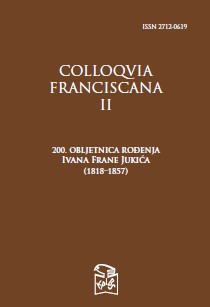Pripovijedanje kao otpor metafizici zla: relacije franjevačkih ljetopisa iz 18. stoljeća s opusom Ive Andrića i Josipa Mlakića
Narration as a resistance to the metaphysics of evil: the relations betwen eighteenth-century Bosnian Franciscan chronicles and work of Ivo Andrić and Josip Mlakić
Author(s): Maja VrkićSubject(s): Metaphysics, Comparative Study of Literature, Bosnian Literature, Croatian Literature, 18th Century, Theory of Literature
Published by: Franjevačka teologija Sarajevo
Keywords: narration; evil; intertextuality; 18th century Franciscan chronicles; Ivo Andrić; Josip Mlakić; history; Bosnia; friars; memory;
Summary/Abstract: This paper analyzes intertextual relations between the 18th century Franciscan chronicles and the selected works of Ivo Andrić and Josip Mlakić, taking into consideration the theoretical concepts of narration and evil. Based on the selected 18th century Franciscan chronicles, the paper examines the connection between narration as memory and history as „magistra vitae.“ Consequently, narration is established as a source of knowledge, but also as the guardian of threatened identity. Furthermore, the analysis shows the importance of the 18th century chronical tradition within the works of Ivo Andrić, including the short stories of the so called „franjevački ciklus“ (The Franciscan Cycle) and his novels Travnička hronika (Bosnian Chronicle), Na Drini ćuprija (The Bridge on the Drina) and Prokleta avlija (Damned Yard). The structural logic of these works is dependent on the repetition of historical evil inscribed in Bosnia, which is in turn written-out through the the figure of the Bosnian Franciscan. Franciscans, thus shaped by Andrić, reveal the shift from politics to poetics and ultimately become symbols of narration and memory. Moreover, this symbol is later employed in Josip Mlakić’s works, particularly in the novel Tragom zmijske košuljice (Tracing the Snakeskin). The paper further shows how Mlakić’s novels rely on the same repetition of evil, but otherwise differ in the way narration is understood. His novel Kad magle stanu (When the Mists Have Stopped) thematizes the failure of narrating uniform identity and reveals new narratives that provide the basis on which the subject can independently (de)construct itself. The analysis of the novel Evanđelje po Barabi (The Gospel According to Barabbas) then emphasizes the performativity of unreliable narration which takes part in constructing the idea of the world and of evil. Finally, the complex nature of story and its equivalence to life governed by inexpressible evil is examined in the context of Mlakić’s novel Skica u ledu (A Sketch in Ice).
Journal: Colloquia franciscana
- Issue Year: 2020
- Issue No: II
- Page Range: 237-316
- Page Count: 80
- Language: Croatian

